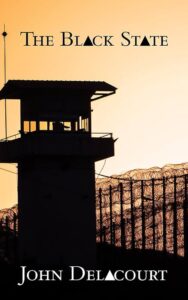Geopolitical thrills
The Black State
by John Delacourt
Surrey: Now or Never Publishing, 2024
$19.95 / 9781989689608
Reviewed by Valerie Green
*

John Delacourt’s novel The Black State opens in a café in Rabat, Morocco, where Canadian photographer Henry Raeburn is talking to café owner Hacene. Hacene shows concern for Henry and what he is about to do and states: “It is like you’re going hunting, monsieur.”
The reader immediately has a sense of danger for Henry. He’s about to set off for Temara to take photographs outside one of the international “black sites” where detainees are held prisoner and suffer unspeakable torture in the name of Western government intelligence gathering. These sites are clandestine detention centres, not found on maps, and operated by a state that incarcerates prisoners for crimes they may not have committed and then mistreats them and gives them no recourse for due process.
After his conversation with Hacene is over, Henry slings his camera gear over his shoulder and his journey to Temara begins. The author then recounts a great deal of back story before Henry reaches the designated site. To get the perfect shots once there, he shoots from a distance and imbues the images with his love of art and passion for politics.
In passages such as this, Delacourt’s writing is superb:
The one thing he had come to realize with this photography project was how powerful the weaponizing of solitude was. That was the point of this photo series, really. The deeper he could reflect on these structures, the better the shots. All at a distance, the viewer reflecting on the design of these machines for constant surveillance that slowly crushed the soul through isolation
. . . they eluded the relentless photomapping of the earth.
Unexpectedly, Henry sees an SUV approach on the deserted road and come to a stop. A policeman tells him he is under arrest. He is then flung to the ground by another and handcuffed. His beloved camera with all the shots he’ he’d taken so carefully is put in the back of the SUV.
As the story progresses, the reader learns more of Henry’s background. He was born into a family of wealth and political pedigree in Vancouver’s Kerrisdale neighbourhood. In his teen years, he suffered a period of drug addiction; it landed him homeless and living on the streets. Fortunately, he recovered and found his calling and talent in art photography, which led to a lucrative international career that has brought him to this assignment in Morocco.
Some of Delacourt’s backstories are long and rambling and take away from the pace of the plot; a globe-trotting plot that is complicated at best and, at times, hard to follow. The Black State isn’t a wholly easy read. The reader needs to concentrate, especially when a multitude of new characters fill the pages.
All these characters are attention-grabbing but, again, Delacourt (Butterfly) tends to digress on occasion away from the main story while telling a backstory of the newly introduced character. They include, for instance, Ashim Khadikar and Torquil Fosey at the Canadian Embassy, where Henry Raeburn is first taken and interrogated. The reader then learns of Yasmin, articling in law in America, a possible love interest of Henry’s, and Henry’s parents, Senator Gordon MacPhail and Marithe, now Gordon’s ex-wife. Yasmin’s boss, Hannah, is also introduced into the story that sways back and forth between Canada, the US, the UK, and Henry’s current incarceration in assorted Moroccan locales.

To further complicate the story there is also a long-ago love connection between Gordon and Hannah long before he met and married Marithe.
The complex plot picks up speed and excitement when Henry is kidnapped by a group of insurgents during a transfer by the government to another prison. An exorbitant ransom is demanded by them for his release. Henry’s father uses all his political connections to free his son, while Yasmin, and Henry’s friend Garry in the US work to achieve the same goal. Yasmin decides to leave the US and come to Morocco where she reunites with an old love, Gato, the leader of the insurgent group who have captured Henry.
After the kidnapping, readers are introduced to even more characters; many are part of the insurgent group fighting for their cause of freeing the detainees in the black sites and subsequently win their country back. A concentrated attempt is needed to remember all the names but with effort the book will hold your interest until the final page. The stimulating ending will leave the reader wanting more answers—perhaps in a sequel? The story left me thinking that although it began as Henry’s story, it was really Gordon and Hannah’s narrative.
The Black State is an exciting political thriller authored by a skilled writer who delves into a dark subject of intrigue and adventure while introducing his readers to a little-known world.
*

Valerie Green was born and educated in England, where she studied journalism and law. Her passion was always writing from the moment she first held a pen in her hand. After working at the world-famous Foyles Books in London (followed by a brief stint with M15 and legal firms), she moved to Canada in 1968 and embarked on a long career as a freelance writer, columnist, and author of over twenty nonfiction historical and true-crime books. Hancock House recently released the first three books—Providence, Destiny, and Legacy—of Valerie’s four-book historical fiction series The McBride Chronicles. Now semi-retired (although writers never really retire!) she enjoys taking short road trips around BC with her husband, watching their two beloved grandsons grow up and, of course, writing. [Editor’s note: Valerie Green has reviewed Laurel Dykstra, Andrea Warner, J.T. Siemens, Russel Barrie, Christine Sinclair (with Stephen Brunt), Grant Heyter-Menzies, Roberta Rich, Linda L. Richards, Patti Shales Lefkos, Reed Stirling, Padma Viswanathan for BCR.]
*
The British Columbia Review
Interim Editors, 2023-25: Trevor Marc Hughes (non-fiction), Brett Josef Grubisic (fiction)
Publisher: Richard Mackie
Formerly The Ormsby Review, The British Columbia Review is an online book review and journal service for BC writers and readers. The Advisory Board now consists of Jean Barman, Wade Davis, Robin Fisher, Barry Gough, Hugh Johnston, Kathy Mezei, Patricia Roy, Maria Tippett, and Graeme Wynn. Provincial Government Patron (since September 2018): Creative BC. Honorary Patron: Yosef Wosk. Scholarly Patron: SFU Graduate Liberal Studies. The British Columbia Review was founded in 2016 by Richard Mackie and Alan Twigg.
“Only connect.” – E.M. Forster
2 comments on “Geopolitical thrills”